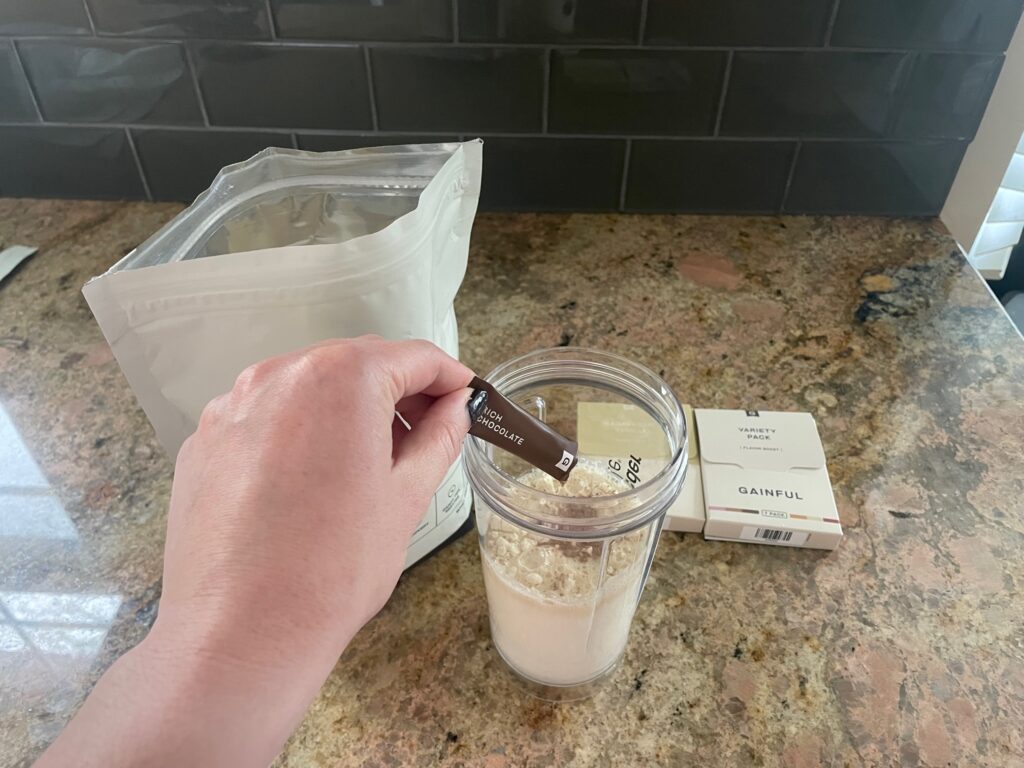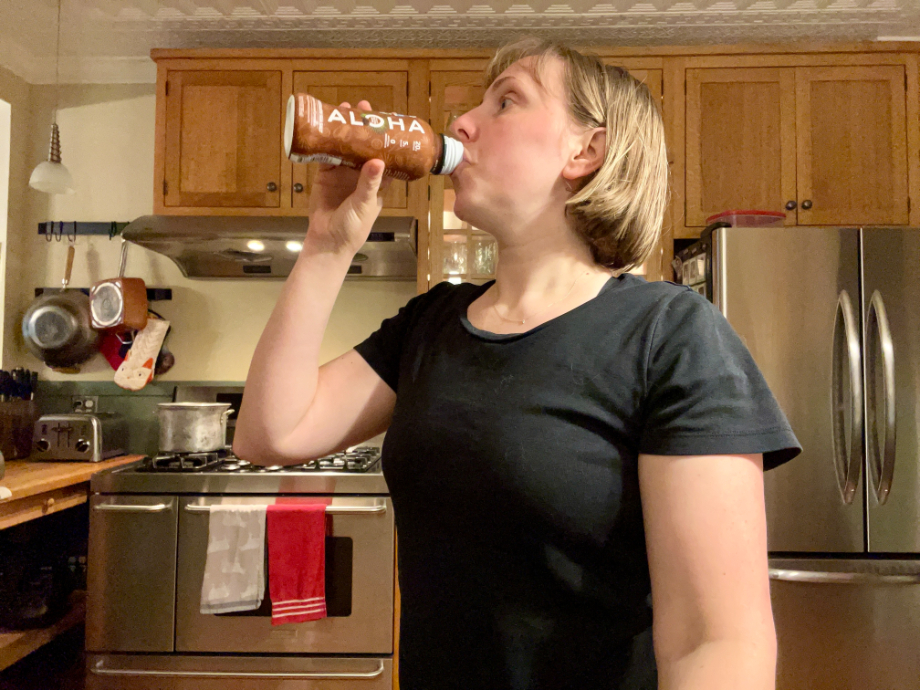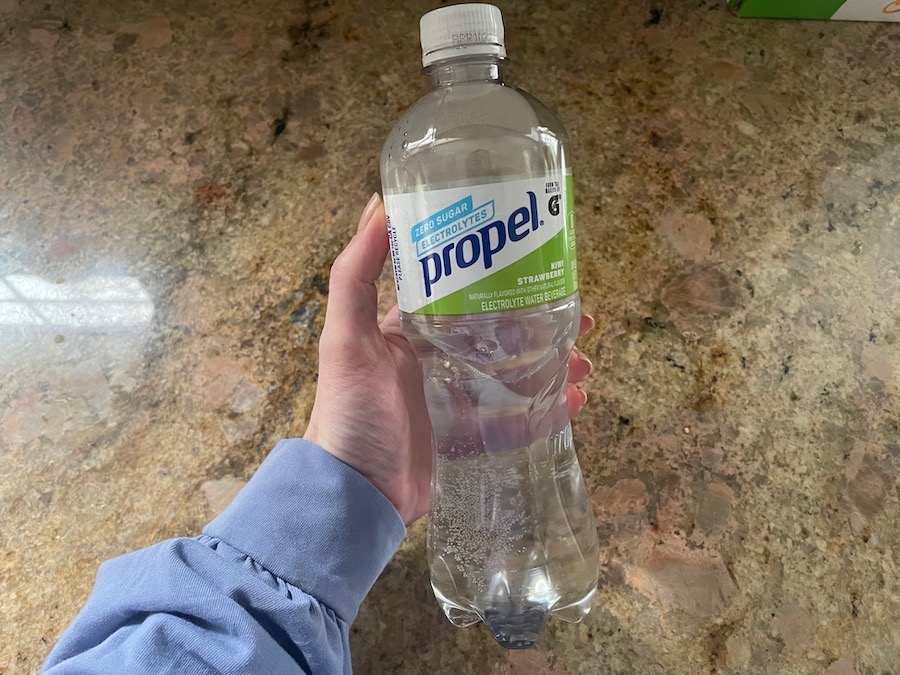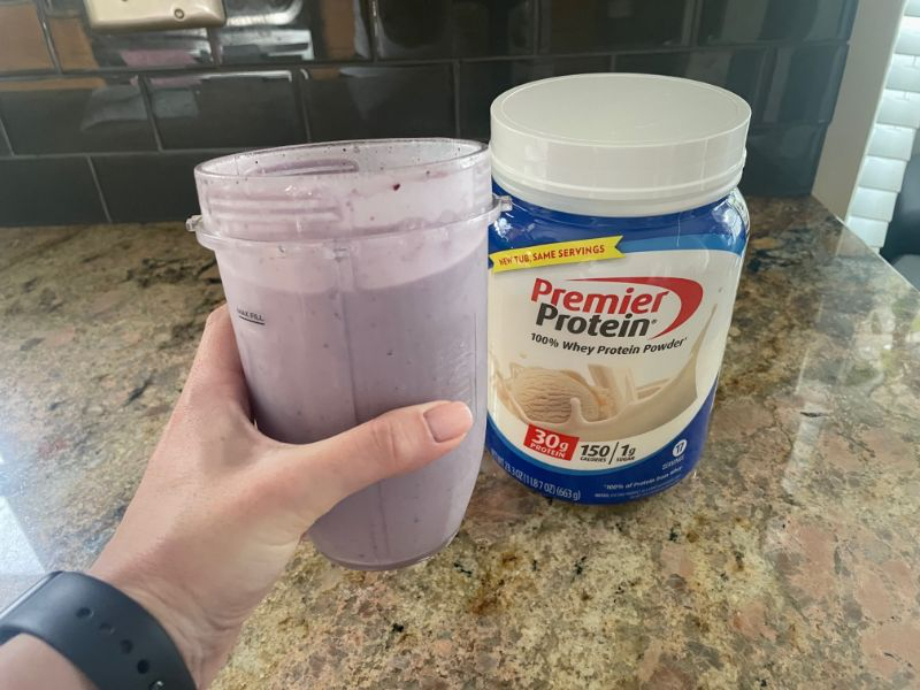We test and review fitness products based on an independent, multi-point methodology. If you use our links to purchase something, we may earn a commission. Read our disclosures.
People often wonder if consuming protein, through supplements or food, impacts their frequency of going number two. There might have been a time when you were increasing your protein, only to find yourself spending more time in the bathroom. This leaves us with one pressing question: Does protein make you poop?
RELATED: High-Protein Diet Side Effects
Don’t get me wrong, regularity is something to celebrate, but if your bowels need a break from protein-induced bathroom trips, you’ll want to read this.
In this article, I’ll explore how the choice of protein, staying properly hydrated, and ingredients in the best protein powders can influence how protein interacts with your digestion.
Medical disclaimer: This article is intended for educational and informational purposes only. It is not intended as a substitute for medical advice. For health advice, contact a licensed healthcare provider.
What is Protein?
Protein, one of the three macronutrients alongside carbohydrates and fat, plays a crucial role in the growth, repair, and maintenance of various tissues within the human body. When you digest protein, your body breaks down the macronutrient into amino acids, which are absorbed into your bloodstream to carry out several biological functions.
Amino acids help maintain, build, and repair lean muscle mass. But that’s just the start of all they’re involved in. Amino acids from protein also support energy production1, wound healing2, hormone regulation3, enzyme activity, immune support4, and skin, hair, and nail health.
Protein is found in both plant and animal sources. Animal sources, like chicken breast protein, beef, and turkey, are considered complete proteins because they provide all nine essential amino acids your body cannot produce on its own. Most plant sources like seeds, tofu, and legumes are not complete proteins; however, you can mix them together for a more balanced and complete essential amino acid intake.

How Much Protein Do I Need?
The daily recommended dietary allowance (RDA) for protein intake is 0.8 grams per kilogram of body weight5 for adults (g/kg/d). To put this into perspective, an adult who weighs 150 pounds would need a minimum of 55 grams of protein daily. However, it’s important to note that individual protein requirements can vary based on factors like age, activity level, and specific health goals.
Several respected nutrition and fitness organizations, including the Academy of Nutrition and Dietetics, the American College of Sports Medicine, and the International Society for Sports Nutrition6, advise that active adults should aim for a higher daily protein intake of 1.2 to 2.0 grams per kilogram of body weight to enhance muscle recovery and optimize performance. Therefore, an adult who engages in regular physical activity and weighs 150 pounds may need between 82 to 136 grams of protein daily in order to avoid protein deficiency.
It’s typically advised not to surpass 2 grams of protein per kilogram of body weight daily, as this could have adverse effects and is unlikely to offer further benefits. Studies, such as a 2022 study in the Journal of the American society of Nephrology7, found that too much protein can be problematic for individuals with pre-existing kidney disease since compromised kidneys must exert additional effort to eliminate nitrogen and other byproducts of protein metabolism.
RELATED: How Much Protein is Too Much?
Benefits of Protein
Consuming enough protein provides a range of health advantages. Here are some of the benefits of incorporating a sufficient quantity of protein into your diet:
- Muscle maintenance and growth: Protein plays a crucial role in supporting muscle strength and growth8, making it especially important for athletes and bodybuilders.
- Weight management: Protein encourages satiety—which means it helps keep you feeling fuller for longer—potentially reducing unnecessary snacking.
- Boosts metabolism: Protein has a higher thermic effect of food (TEF)9 than carbs and fat. This means you burn more calories digesting and metabolizing it.
- Wound healing: Protein plays a vital role in the repair and regeneration of damaged tissues.
- Strong skin, hair, and nails: Collagen is a type of protein, and the potential benefits of collagen protein include maintaining healthy skin, hair, and nails.
- Blood sugar management: Protein helps stabilize blood sugar levels10 by preventing glucose spikes.
How Does Your Body Digest Protein?
Protein digestion primarily takes place in the stomach. When the protein you eat and chew reaches the stomach, hydrochloric acid (HCl) and pepsin team up to start breaking it down. Hydrochloric acid (HCl) creates an acidic environment that denatures proteins, making them easier to break down. Pepsin is an enzyme that partially breaks down protein into smaller strings of amino acids.
The partially digested protein then enters the small intestine, where it’s further broken down into individual amino acids by the digestive enzymes trypsin, chymotrypsin, and carboxypeptidase. Finally, the amino acids are absorbed into the bloodstream by passing through the lining of the small intestine.

Once in the bloodstream, amino acids are transferred throughout the body, where they serve many biological functions, including wound healing and muscle growth.
Protein powder is digested the same as protein from food. The speed at which protein powder is absorbed can vary based on the specific type of protein. For instance, whey protein shakes are absorbed more rapidly compared to casein protein.
RELATED: Casein Protein Vs. Whey
Some athletes prefer taking whey protein after a workout because it offers a quick amino acid supply to their muscles. On the other hand, some like to take casein before bedtime as it’s more slowly absorbed and may support muscle recovery while sleeping11.
So, Does Protein Make You Poop?
First, let’s make one thing clear: Protein itself doesn’t inherently make you poop. However, there are several indirect reasons you might find yourself increasingly regular when consuming more protein.
Fiber
Plant-based protein sources like beans and lentils are high in fiber, which could cause your bowels to rumble. Fiber is well known for its ability to promote regular bowel movements, but it also helps manage blood sugar and may lower cholesterol levels12. Women need 21 to 25 grams, and men need 30 to 38 grams of daily fiber13.
Insoluble fiber promotes regular bowel movements and helps prevent constipation by adding bulk to your stool. Dietary fiber also helps promote peristalsis14, the rhythmic contraction of muscles within your digestive system that propels food and waste through your intestines. This natural process helps move stool along and could result in more bathroom breaks.
RELATED: Best Fiber Supplement
In some cases, a sudden increased intake of insoluble fiber can have a laxative effect, causing diarrhea. If you’ve suddenly started eating more high-fiber protein foods or supplements, your body is likely adjusting to the influx of fiber.
Hydration
Consuming a high-protein diet calls for greater fluid intake, which can lead to more bowel movements. When your body digests a lot of protein, it produces urea as a waste product. Urea is excreted by the kidneys through urine. Proper hydration helps the kidneys efficiently eliminate urea and other waste products from your system.

If you’ve increased your water intake since starting a high-protein diet, you may have more frequent bowel movements because water helps to keep stool soft and move it through the digestive tract.
Lactose Intolerance
Lactose is a natural sugar present in milk and dairy items. Lactose intolerance15 can impact those who use protein powder, particularly those derived from milk sources like whey and casein.
People with a lactose intolerance lack lactase, an enzyme that breaks down lactose in the small intestines. When undigested lactose moves into the large intestine, it can ferment and lead to gastrointestinal distress, such as bloating, gas, and diarrhea15.
RELATED: Best Lactose-Free Protein Powder
If you are lactose intolerant, you may want to avoid milk and dairy foods, including whey and casein protein. Some people who are lactose intolerant can tolerate whey protein isolate because it is heavily filtered, removing most lactose and fat. Egg white, soy, and pea protein powder are often milk-free and suitable for those who are lactose intolerant.
Artificial Sweeteners or Sugar Alcohols
Artificial sweeteners and sugar alcohols are often used in foods and supplements because they are low-calorie sweeteners that don’t raise blood sugar.
The excessive consumption of sugar alcohols, such as sorbitol, mannitol, and erythritol, have been shown in clinical trials16 to potentially cause gastrointestinal symptoms such as gas or laxative effects. Sorbitol, in particular, exerts a high osmotic load in the gastrointestinal tract. This results in increased water in the colon, which contributes to more bowel movements.
Although more research16 is needed, artificial sweeteners like sucralose and saccharin may impact the gut microbiota, which consists of various microorganisms throughout the digestive tract. A modified gut microbiota can disturb the balance between beneficial and harmful bacteria, potentially resulting in changed bowel habits.
Gut Microbiota
A high-protein diet may reduce health-promoting bacteria in the microbiota. One 2018 study17 found that endurance athletes taking animal-based protein supplements for 10 weeks had a decrease in beneficial bacteria, Blautia, Roseburia, and Bifidobacterium longum. These bacteria are linked to improved immune health, reduced intestinal inflammation, and improved intestinal barrier function.
Further research is needed to understand how a high-protein diet impacts the gut and its long-term effects. Alterations in the gut microbiota can have an effect on bowel habits since an imbalance between good and harmful bacteria may disrupt the digestive process and the overall health of the gut. A balanced, high-fiber diet can help maintain a balanced gut.
RELATED: Do Greens Make You Poop?
Can Protein Cause Constipation?
Protein alone does not cause constipation, but you may find yourself backed up when eating a high-protein diet for other reasons. If you’re working hard to maintain lean mass or build muscle, it’s easy to become hyper-focused on your protein intake.

Unfortunately, many protein foods like meat, poultry, and protein powders are low in fiber. As previously mentioned, fiber helps add bulk to your stool and supports regularity. Include protein sources in your diet that contain fiber, like nuts, seeds, beans, tofu, and lentils, to avoid constipation.
RELATED: Best Fiber Supplements for Constipation
Furthermore, a high-protein diet increases your body’s need for additional water to aid various metabolic processes. Staying adequately hydrated helps facilitate the breakdown and elimination of waste products, like urea, generated during protein metabolism. If you don’t drink enough water, you may become dehydrated, which could lead to constipation.
My Expert Recommendations
Everyone’s nutritional needs are different, so talk with your doctor or registered dietitian nutritionist for personalized recommendations. Here are some general guidelines that may help you avoid bowel distress when consuming a high-protein diet:
- Stay adequately hydrated to lubricate the digestive tract, eliminate waste products of protein metabolism, keep stool soft and easy to pass, and avoid constipation.
- Eat a balanced diet rich in fiber and healthy fats to bulk up stool, lubricate the digestive tract, and promote regular bowel movements.
- If you are sensitive to artificial sweeteners and alcohol sugars, choose protein supplements without these ingredients.
- Increase your protein intake slowly to allow your body and your gut microbiota to adjust.

Does Protein Make You Poop? Final Thoughts
Protein alone doesn’t directly cause you to have more bowel movements. However, the type of protein-rich foods you consume, your overall diet, hydration status, and common ingredients in protein powders can impact your bathroom habits when following a high-protein diet. Not getting enough fiber, consuming artificial sweeteners commonly found in protein supplements, and changes in the gut microbiota when upping your protein consumption could be the culprits to your changing bowel habits.
- Most athletes benefit from between 1.2-2.0 g/kg/day of dietary protein6
- Protein breaks down into amino acids that repair and build muscles
- Eating a high-protein diet may make you poop if you aren’t properly hydrated, eating enough fiber, or sensitive to sugar alcohols in supplements
- Eat a balanced diet, drink plenty of water, and increase your protein intake slowly to avoid digestive issues
Does Protein Make You Poop? FAQs
Does protein affect your bowel movements?
Protein on its own doesn’t directly affect bowel movements. Fiber content, hydration, artificial sweeteners, and sugar alcohols may impact your bowel habits when following a high-protein diet.
What are signs of too much protein?
Bad breath, constipation, weight gain, and dehydration may indicate that you’re eating too much protein. These side effects are often the result of an imbalanced diet, where an overemphasis on protein consumption leads to the neglect of other nutrients.
RELATED: High-Protein Diet Side Effects
What happens if you eat protein and don’t workout?
Eating protein is still important if you don’t work out. It plays a crucial role in the growth, repair, and maintenance of tissues throughout the human body.
Does protein help you lose weight?
Yes, eating more protein may help with weight loss. Protein improves satiety, which could reduce unnecessary eating. If consumed along with a resistance training routine, protein can help you gain muscle and boost your metabolism, meaning you burn more calories throughout the day.
These statements have not been evaluated by the Food and Drug Administration. This product is not intended to diagnose, treat, cure, or prevent any diseases.
References
- National Research Council (US) Subcommittee on the Tenth Edition of the Recommended Dietary Allowances. Recommended Dietary Allowances: 10th Edition. Washington (DC): National Academies Press (US); 1989. 6, Protein and Amino Acids. Available from: https://www.ncbi.nlm.nih.gov/books/NBK234922/
- Arribas-López E, Zand N, Ojo O, Snowden MJ, Kochhar T. The Effect of Amino Acids on Wound Healing: A Systematic Review and Meta-Analysis on Arginine and Glutamine. Nutrients. 2021 Jul 22;13(8):2498. doi: 10.3390/nu13082498. PMID: 34444657; PMCID: PMC8399682.
- Miers WR, Barrett EJ. The role of insulin and other hormones in the regulation of amino acid and protein metabolism in humans. J Basic Clin Physiol Pharmacol. 1998;9(2-4):235-53. doi: 10.1515/jbcpp.1998.9.2-4.235. PMID: 10212837.
- Li P, Yin YL, Li D, Kim SW, Wu G. Amino acids and immune function. Br J Nutr. 2007 Aug;98(2):237-52. doi: 10.1017/S000711450769936X. Epub 2007 Apr 3. PMID: 17403271.
- Wu G. Dietary protein intake and human health. Food Funct. 2016 Mar;7(3):1251-65. doi: 10.1039/c5fo01530h. PMID: 26797090.
- Campbell B, Kreider RB, Ziegenfuss T, La Bounty P, Roberts M, Burke D, Landis J, Lopez H, Antonio J. International Society of Sports Nutrition position stand: protein and exercise. J Int Soc Sports Nutr. 2007 Sep 26;4:8. doi: 10.1186/1550-2783-4-8. PMID: 17908291; PMCID: PMC2117006.
- Ko GJ, Rhee CM, Kalantar-Zadeh K, Joshi S. The Effects of High-Protein Diets on Kidney Health and Longevity. J Am Soc Nephrol. 2020 Aug;31(8):1667-1679. doi: 10.1681/ASN.2020010028. Epub 2020 Jul 15. PMID: 32669325; PMCID: PMC7460905.
- Carbone JW, Pasiakos SM. Dietary Protein and Muscle Mass: Translating Science to Application and Health Benefit. Nutrients. 2019 May 22;11(5):1136. doi: 10.3390/nu11051136. PMID: 31121843; PMCID: PMC6566799.
- Ravn AM, Gregersen NT, Christensen R, Rasmussen LG, Hels O, Belza A, Raben A, Larsen TM, Toubro S, Astrup A. Thermic effect of a meal and appetite in adults: an individual participant data meta-analysis of meal-test trials. Food Nutr Res. 2013 Dec 23;57. doi: 10.3402/fnr.v57i0.19676. PMID: 24376394; PMCID: PMC3873760.
- Gannon MC, Nuttall FQ, Saeed A, Jordan K, Hoover H. An increase in dietary protein improves the blood glucose response in persons with type 2 diabetes. Am J Clin Nutr. 2003 Oct;78(4):734-41. doi: 10.1093/ajcn/78.4.734. PMID: 14522731.
- Kim J. Pre-sleep casein protein ingestion: new paradigm in post-exercise recovery nutrition. Phys Act Nutr. 2020 Jun 30;24(2):6-10. doi: 10.20463/pan.2020.0009. PMID: 32698256; PMCID: PMC7451833.
- Aller R, de Luis DA, Izaola O, La Calle F, del Olmo L, Fernandez L, Arranz T, Hernandez JM. Effect of soluble fiber intake in lipid and glucose levels in healthy subjects: a randomized clinical trial. Diabetes Res Clin Pract. 2004 Jul;65(1):7-11. doi: 10.1016/j.diabres.2003.11.005. PMID: 15163472.
- Guo K., Yao Z., Yang T. Intestinal microbiota-mediated dietary fiber bioavailability. Frontiers in Nutrition. Volume 9, 2022, https://www.frontiersin.org/articles/10.3389/fnut.2022.1003571
- Akbar A, Shreenath AP. High Fiber Diet. [Updated 2023 May 1]. In: StatPearls [Internet]. Treasure Island (FL): StatPearls Publishing; 2023 Jan-. Available from: https://www.ncbi.nlm.nih.gov/books/NBK559033/
- Malik TF, Panuganti KK. Lactose Intolerance. [Updated 2023 Apr 17]. In: StatPearls [Internet]. Treasure Island (FL): StatPearls Publishing; 2023 Jan-. Available from: https://www.ncbi.nlm.nih.gov/books/NBK532285/
- Ruiz-Ojeda FJ, Plaza-Díaz J, Sáez-Lara MJ, Gil A. Effects of Sweeteners on the Gut Microbiota: A Review of Experimental Studies and Clinical Trials [published correction appears in Adv Nutr. 2020 Mar 1;11(2):468]. Adv Nutr. 2019;10(suppl_1):S31-S48. doi:10.1093/advances/nmy037
- Moreno-Pérez D, Bressa C, Bailén M, et al. Effect of a Protein Supplement on the Gut Microbiota of Endurance Athletes: A Randomized, Controlled, Double-Blind Pilot Study. Nutrients. 2018;10(3):337. Published 2018 Mar 10. doi:10.3390/nu10030337
Further reading

Is a natural pre-workout all it’s cracked up to be? Find out in our honest Legion Pulse review. Read more

It’s been a fun year of seeing fantastic new equipment, supplements, and apparel. Now the GGR Staff picks their top fitness releases of 2023. Read more

Wondering how to sell a used treadmill? We have a number of tips to help you score cash for your machine. Read more

Is protein powder bad for your kidneys? A registered dietitian explains how to support your kidneys without sabotaging your gains! Read more

